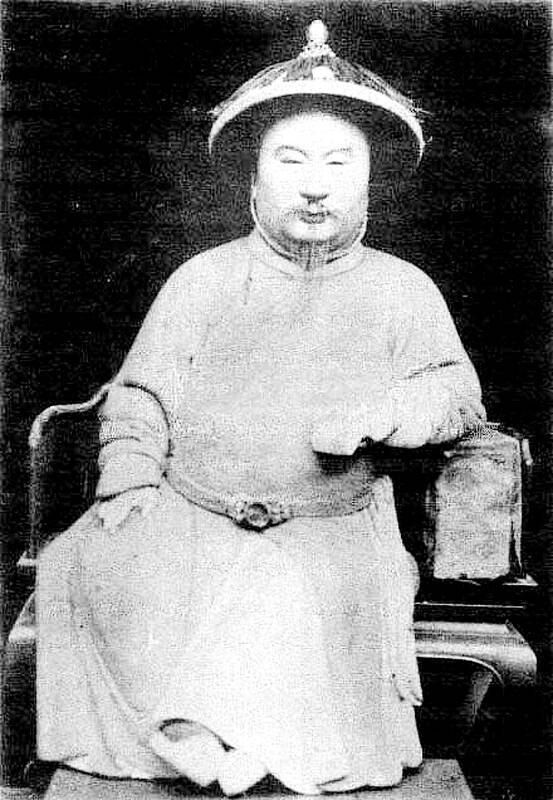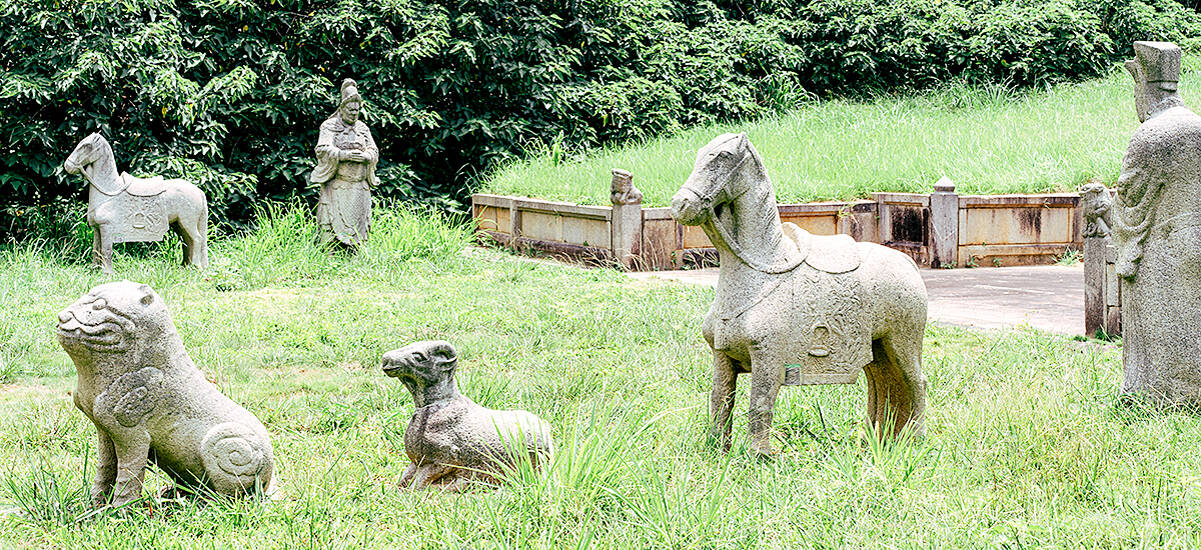May 13 to May 19
While Taiwanese were eligible to take the Qing Dynasty imperial exams starting from 1686, it took more than a century for a locally-registered scholar to pass the highest levels and become a jinshi (進士).
In 1823, Hsinchu City resident Cheng Yung-hsi (鄭用錫) traveled to Beijing and accomplished the feat, returning home in great glory. There were technically three Taiwan residents who did it before Cheng, but two were born in China and remained registered in their birthplaces, while historians generally discount the third as he changed his residency back to Fujian Province right after the exams.

Photo courtesy of Wikimedia Commons
Aside from spending three years in Beijing as a court official, Cheng preferred to stay in his hometown. A prolific essayist, poet and historian, one of Cheng’s more notable works is Persuasion of Peace (勸和論), which urged warring factions claiming ancestry from different parts of China to stop their constant armed conflicts. A noted philanthropist, Cheng promoted education and contributed to several public projects, including the upgrading of Hsinchu’s earth walls to stone in 1829.
Several historical relics related to Cheng remain, including his impressive Qing official-style grave site in Hsinchu’s East District (東區), guarded by twin stone guards, horses, goats and tigers. Last Friday, a vandal allegedly hacked off and stole the head of one of the goats.
Interestingly, this is not the first time it has happened. A China Times (中國時報) report from 1994 shows that the long-neglected site was in disarray with one stone tiger and the heads of the goats missing. Cheng’s descendants told the paper that local farmers probably did it out of superstition that the stone goats would trample on their crops.

Photo courtesy of Wikimedia Commons
PROMISING ACADEMIC
Cheng was born in 1788 in Miaoli’s Houlong Township, but his family moved to Hsinchu when he was eight years old. According to his biography by Cheng Fan-pai (鄭藩派), the family originated in Fujian Province’s Zhangzhou (漳州), relocating to Kinmen in the late 1600s and then to Taiwan in two waves during the mid-1700s. Cheng Fan-pai appears to be part of the family that remained in Kinmen.
Cheng Yung-hsi’s father Cheng Chung-ho (鄭崇和) was part of the second migration, arriving with several relatives in 1774 at the age of 18. Cheng Yung-hsi wrote that his father wanted to start a new life after failing the imperial exams several times and a famine ravaged Kinmen. Cheng Chung-ho opened a successful private school in Hsinchu and was also involved in other businesses, and by the early 1800s he had become a respected leader in the city.

Photo courtesy of Hsinchu City Government
Cheng Yung-hsi was academically inclined from a young age, and reportedly spent much of his youth buried in books. After passing county examinations at the age of 23, the family elders encouraged him to continue studying and aim for higher-level exams, vowing to support him in any way they could. Cheng failed his first stab at the provincial exams held in Fuzhou in 1818, but succeeded two years later, earning the title of juren (舉人).
Next were the national exams in Beijing. In 1823, Cheng finished 41th in the preliminary exams and 109th in the finals, successfully becoming a jinshi. He then began his teaching career, taking over in 1829 as headmaster of the Mingzhi Academy (明志書院), northern Taiwan’s first academy.
Cheng also helped construct the Hsinchu Confucius Temple (completed in 1824) and served on its board of directors.
PUBLIC AFFAIRS
Cheng served as an official in Beijing from 1834 to 1837. According to his poems, he could not get used to the conniving bureaucratic environment at court and cared little for the decadent lifestyle. He would rather be care-free and happy in his homeland, tending to his aging mother and helping with local affairs.
He built his residence, Jinshidi (進士第), soon after returning and resumed teaching at the Mingzhi Academy. Cheng spent most of his effort promoting education in Hsinchu, but he was also in active in activities involving his ancestral homeland, such as donating funds to renovate the Lukang Kinmen Hall (鹿港金門館) in Changhua County.
Cheng was rewarded by the Qing court several times for helping the army deal with unrest. He was greatly bothered that local factions, particularly those with ancestry from Fujian Province’s Quanzhou and Zhangzhou prefectures, could never get along and frequently engaged in open armed conflict. Clashes took place in different parts of northern Taiwan throughout the 1850s, with a particularly serious incident taking place in 1853 in today’s Wanhua District (萬華).
This event saw Quanzhou and Tongan (同安, technically in Quanzhou but speaking a different dialect) groups clash over rights to the port in Taipei’s Wanhua District (萬華). The Tongan faction was routed and their buildings torched, and the survivors fled north and established today’s Dadaocheng and Xiahai City God Temple. Dadaocheng eventually superseded Wanhua in prosperity.
PLEA FOR PEACE
Cheng was alarmed that even Quanzhou people were now fighting each other, wrote his plea for peace the following year, warning that continuing on this path will only lead to mutual destruction.
“Zixia (子夏) once said, ‘all men within four seas are brothers,’ much less those who live in the same neighborhood,” he wrote. “The ancient sages told us that those who share a home should support each other. How has the division between us become so extreme?”
“We all immigrated from China to Taiwan, therefore now we’re all Taiwanese ... ruled by the same Taiwan prefectural government. Isn’t it very strange that we insist on dividing ourselves into opposite groups?”
Finally, he writes that if people can settle their differences and care for both those who are similar and different, “in a few years, Taiwan will become a paradise on earth. Wouldn’t that be wonderful?”
Cheng died in 1858, and his body was moved to its current location in 1869. The grave was already in bad shape when city officials visited it in 1984, noting that most of the statues were barely visible in the overgrown grass.
The goat heads were already gone at that point. The 1994 report stated that the government would not replace the heads, and it’s unclear when they were restored.
Taiwan in Time, a column about Taiwan’s history that is published every Sunday, spotlights important or interesting events around the nation that either have anniversaries this week or are tied to current events.

Last week the State Department made several small changes to its Web information on Taiwan. First, it removed a statement saying that the US “does not support Taiwan independence.” The current statement now reads: “We oppose any unilateral changes to the status quo from either side. We expect cross-strait differences to be resolved by peaceful means, free from coercion, in a manner acceptable to the people on both sides of the Strait.” In 2022 the administration of Joe Biden also removed that verbiage, but after a month of pressure from the People’s Republic of China (PRC), reinstated it. The American

Chinese Nationalist Party (KMT) legislative caucus convener Fu Kun-chi (傅?萁) and some in the deep blue camp seem determined to ensure many of the recall campaigns against their lawmakers succeed. Widely known as the “King of Hualien,” Fu also appears to have become the king of the KMT. In theory, Legislative Speaker Han Kuo-yu (韓國瑜) outranks him, but Han is supposed to be even-handed in negotiations between party caucuses — the Democratic Progressive Party (DPP) says he is not — and Fu has been outright ignoring Han. Party Chairman Eric Chu (朱立倫) isn’t taking the lead on anything while Fu

Feb 24 to March 2 It’s said that the entire nation came to a standstill every time The Scholar Swordsman (雲州大儒俠) appeared on television. Children skipped school, farmers left the fields and workers went home to watch their hero Shih Yen-wen (史艷文) rid the world of evil in the 30-minute daily glove puppetry show. Even those who didn’t speak Hoklo (commonly known as Taiwanese) were hooked. Running from March 2, 1970 until the government banned it in 1974, the show made Shih a household name and breathed new life into the faltering traditional puppetry industry. It wasn’t the first

There is a Chinese Communist Party (CCP) plot to put millions at the mercy of the CCP using just released AI technology. This isn’t being overly dramatic. The speed at which AI is improving is exponential as AI improves itself, and we are unprepared for this because we have never experienced anything like this before. For example, a few months ago music videos made on home computers began appearing with AI-generated people and scenes in them that were pretty impressive, but the people would sprout extra arms and fingers, food would inexplicably fly off plates into mouths and text on